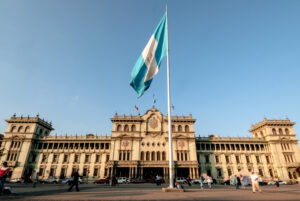PROTECTING CIVIC SPACE: THE CASE OF OMOYELE SOWORE
Sowore spent 144 days in arbitrary detention in Nigeria following attempts to exercise his fundamental rights to freedom of expression and peaceful assembly. In this exclusive interview, his wife Opeyemi and our managing attorney, Wade McMullen, discuss his case and how it represents a powerful symbol for freedom of expression across Africa.
After 143 days of unlawful detention in Abuja, Nigeria, human rights defender and journalist Omoyele Sowore was released on bail on December 24, 2019 and is set to stand trial April 1, 2020.
While Sowore’s release was met with an outpouring of relief from human rights advocates and organizations around the world, that victory was only the first step. Sowore, a husband and father of two, faces life in prison if found guilty of the baseless charge of treason, which the Nigerian Department of State Services leveled against him in retaliation for his attempts to organize peaceful, pro-democracy protests.
Robert F. Kennedy Human Rights, which petitioned for Sowore’s release, has contested the baseless charge for months. Kerry Kennedy, president of RFK Human Rights, re-emphasized that “free speech and peaceful protests are cornerstones to any functioning democracy.”
Sowore, a former presidential candidate for the African Action Conference, is the founder of the website Sahara Reporters, a citizen journalism news site that focuses on exposing corruption, human rights abuses, and other political misconduct in Nigeria. As an activist, Sowore has also called for a series of planned protests against the government, known popularly under the movement called #RevolutionNow, which he created after questioning the credibility of the reelection of President Muhammadu Buhari.
Yet two days before the #RevolutionNow protests were to take place on August 3, 2019, domestic intelligence operatives raided Sowore’s hotel in Abuja early in the morning without a warrant and abducted him. Following five days of detainment without being brought before the court, the Department of State Services (DSS) requested a judicial order to detain him for an additional 90 days to investigate him for “terrorist activity,” invoking an overly vague provision of Nigeria’s antiterrorism legislation that is incompatible with international human rights law. While a court authorized 45 days of further detention, it eventually ordered Sowore to be released at the end of the 45-day term, which the DSS ignored.
Instead, while Sowore remained unlawfully detained, the state charged him with treason, money laundering, and cyberstalking for “insulting the president.” Meanwhile, ignoring the judicial order for his release, a separate Nigerian judge imposed unduly burdensome and disproportionate bail conditions on Sowore’s release: 100 million naira (roughly $273,000) and abstention from the press, engaging with protests, and leaving the city of Abuja (a city in which he has no residence).
The impracticality of these conditions amounts to an effective refusal of bail and a de facto order of continued arbitrary detention, which is a violation of Nigerian and international human rights law.
After bail was reduced, Sowore and his family were able to meet all of the requirements for release in early November 2019, but DSS, again, refused to comply with the court’s directive and detained him until the start of his trial on December 5, 2019.
Sowore was finally released on the first day of his trial, but less than 24 hours later, gun-wielding members of the DSS stormed the Federal High Court, pinned Sowore to the ground, placed him in a chokehold, and forcefully re-arrested him without cause. He remained in DSS custody until December 24, 2019, when he was released on bail. He has remained free since then.
The actions of the DSS and Nigerian authorities demonstrate the rapid deterioration of civic space in Nigeria, which has broader implications for the rest of the continent considering Nigeria’s position as Africa’s most populous democracy.
Sowore’s case is just one example of the lengths to which the Nigerian state will go to stifle opposing voices, crack down on the media, and systematically curtail fundamental freedoms—including freedom of expression and freedom of assembly, which are integral to a functioning democracy. At least 19 journalists, bloggers, and media practitioners were subject to attacks in Nigeria between January and September 2019, according to the Amnesty International report Endangered Voices: Attack on Freedom of Expression in Nigeria. These attacks include verbal and physical assault; indiscriminate arrest, torture, detention; and prosecution through trumped-up charges. The state of Nigeria often employs vague provisions of law to suppress opposing voices and has weaponized the overly broad 2015 Cybercrime Act to curtail freedom of expression and assembly, which subjects journalists and human rights defenders to greater risks of serious criminal charges because of their work.
Sowore faces a charge of cyberstalking under the cybercrime act for “insulting the president,” while other journalists, bloggers, activists, and human rights defenders have been targeted under the “fake news” provision for sharing information that the government deems offensive. The use of these legislative techniques is not unique to Nigeria but is a seemingly cut-and-paste approach that is trending throughout the region and severely curtailing the effectiveness of civil society in many countries.
There has also been a rise in using antiterrorism legislation as a way to silence journalists and human rights defenders under the false pretense of protecting national security. Among the seven charges levied against Sowore, the most serious ones, carrying the lengthiest sentences, stem from Nigeria’s 2013 Anti-Terrorism Act.
RFK Human Rights continues to call on the Nigerian authorities to drop these baseless charges against Sowore and to end the use of repressive legislation to target activists and journalists in an effort to restrict civic space.
Follow Sowore’s case on our website or on Twitter by searching #FreeSoworeNow.



